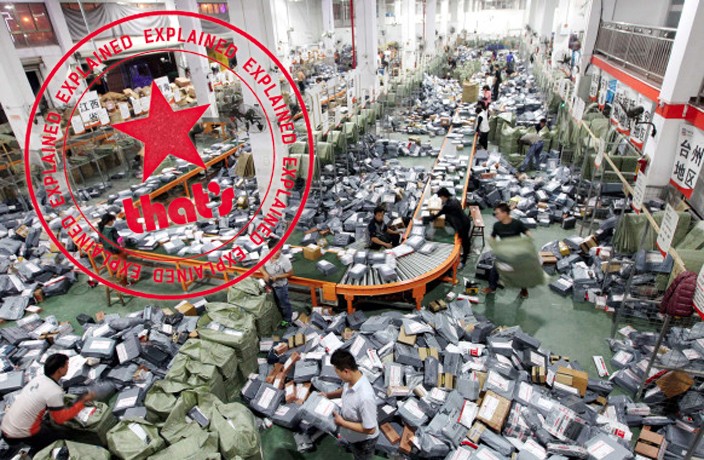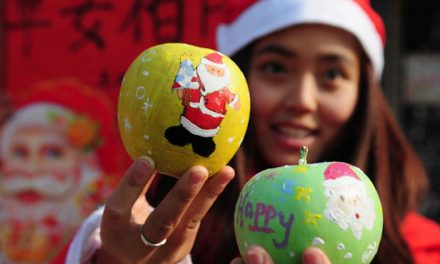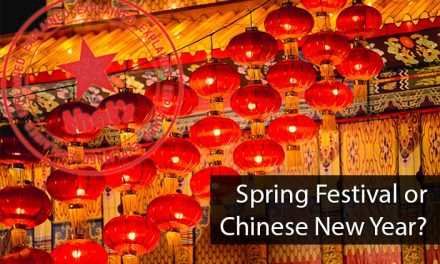is where we explain an aspect of Chinese life. Simple. So now you know.
It’s a common complaint that Christmas and Valentine’s Day have become over-commercialized, but no holiday has been given a capitalist makeover quite like Singles’ Day, when China’s ecommerce giants slash their prices for 24 hours of frantic online sales. Before you scurry off on your cyber bargain hunt, here are 11 things you need to know about the 11th year of the shopping bonanza that is Shuang Shiyi.
1. We should really call it Double 11
The English name Singles’ Day takes its name from the Chinese guanggun jie (光棍节), but the date is now more commonly called shuang shiyi (双十一), or ‘Double 11,’ after the date, November 11, which when written 11/11 conjures the image of four singletons and/or four leafless trees. The Chinese term guanggun literally means ‘bare branches’ and refers specifically to single men. (Single ladies, at least those who’ve reached the age of *gasp* 28 without finding a husband, are known as or ‘leftover women.’)
2. Singles’ Day was started by lonely college guys
Singles’ Day was conceived innocently enough, reputedly in a dorm room at Nanjing University in 1993, by four single male students looking to liven up their lonely lives with fun group activities for singles like KTV-ing and eating – the deep fried breakfast of champions that look like the number yi. The idea quickly grew into a nationwide tradition for young singles, almost certainly spurred by China’s overabundance of young men – a sex ratio imbalance created by the one-child policy.
3. Alibaba turned Singles’ Day into China’s Cyber Monday
This being post-Deng China, someone had to imbue the Valentine’s Day for singles with Chinese characteristics. Enter Alibaba. In 2009, the company was looking for a way to boost sales during the commercial lull between the October Holiday and Chinese New Year, and seized on Singles’ Day – popular with their key user base of Internet-savvy balinghou – as a marketing stunt, convincing 27 merchants to discount their goods on Tmall. By 2014, 27,000 merchants were on board.
4. Actually, Cyber Monday + Black Friday + steroids = not even close
Singles’ Day has seen phenomenal year-on-year growth, with Alibaba’s 2013 sales nearly doubling 2012’s USD3 billion haul. In 2014, Alibaba’s Singles’ Day sales of USD9.3 billion far exceeded the combined sales for Black Friday and Cyber Monday. In the first 90 minutes of November 11, 2015, Alibaba reported sales of USD5 million. And in 2016, Alibaba smashed records again, earning RMB35 billion (USD5 billion) in the first hour of sales. Last year, total sales reached an astounding RMB213.5 billion, with RMB10 billion reached within the first 125 seconds.
5. Future sales are set to soar thanks to smartphones
China’s 1.56 billion active smartphones (greater than the country’s population) has driven tremendous revenue growth in ecommerce as increasing numbers of people from rural China join the online shopping blowout.
6. Singles’ Day isn’t really just one day anymore
Just as the build-up to Christmas seems to begin earlier every year, so it is with 11/11 as sites begin luring customers by advertising discounts in the weeks leading up to the big day – though the payment still occurs on November 11. “It’s [only] 24 hours. You have to work for eight hours and you have to sleep for six hours. They wanted better [results] this year so they started earlier, will last longer, will have a bigger impact and, of course, will make more transactions happen,” Shanghai-based ecommerce expert Oceanne Zhang told the Guardian.
7. 230 countries participated last year
In 2018, 230 countries completed transactions with Tmall during the one-day event, with Japan selling the most to China by GMV. The United States finished second and South Korea and Australia came in third and fourth, respectively.
8. The logistics are mindboggling
In Guangdong alone this year, the number of parcels that will be processed in the province is anticipated to hit 750 million(!). To help tackle the uptick in deliveries, an additional 100,000 temporary kuaidi guys have been hired. Some 20,000 vehicles will also be on standby, according to GRT Radio.
9. “Eleven/Eleven is going global”
So said Alibaba CEO Daniel Zhang, who told Fortune in 2015: “Chinese consumers will be buying an unprecedented assortment of international brands and products from around the world,” among them, Costco, Disney, Lego, Sainsbury’s, Burberry, Estee Lauder, Nike, Topshop and Uniqlo.
10. First Singles’ Day hosted by Jiang Fan
With China’s richest person slash Alibaba co-founder Jack Ma stepping down as chairman in September, this year marks the first time Alibaba executive Jiang Fan will oversee the event. Last year, Ma damn near stole the show, starring in short clips packaging Tmall boxes and applying makeup.
11. Lots of orders placed on Singles’ Day are returned
Amidst all the breathless coverage about the world’s biggest shopping day, it’s worth noting that Double 11 sales figures could do with some scrutiny since they include orders that are later canceled or returned. As Tech in Asia observes, “In the past, Alibaba has said these numbers are trivial – a single-digit percentage of Alibaba’s total sales revenue – but outside estimates sometimes suggest the difference is significant. Research firm Gartner Inc. estimated that about 25 percent of China’s Singles Day purchases in 2013 were returned, for example.”
This article was originally published on Thatsmags.com in November 2015. It has been updated and republished on November 10, 2019.
With files from Ryan Gandolfo
For more of .
[Cover graphic by That's]
This is a place for show life about china, If these articles help you life better in china, Welcome to share this website to your friends, Or you can post questions about china life in FAQ, We will help you to find the right answer.






Recent Comments